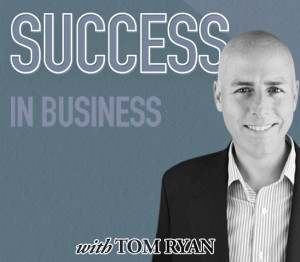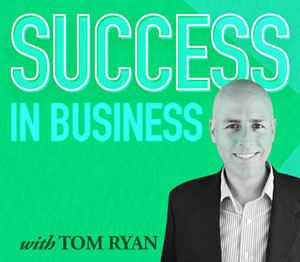 Who do you need on your team when building a great startup? As with so many things in the entrepreneurial world, there is no one easy answer. Every company’s needs are different, but that doesn’t mean that creating your team needs to be a roll of the dice. Here are six guidelines to keep in mind as you build an exceptional team around your startup. Continue reading
Who do you need on your team when building a great startup? As with so many things in the entrepreneurial world, there is no one easy answer. Every company’s needs are different, but that doesn’t mean that creating your team needs to be a roll of the dice. Here are six guidelines to keep in mind as you build an exceptional team around your startup. Continue reading
Author Archives: Tom Ryan
The “Owning Your Own Business” Fallacy
 As a business coach, I’ve talked with countless people about their dreams of owning a business. Along the way, I’ve encountered some deeply rooted misconceptions about what entrepreneurship is really like. It’s easy to see these fallacies when you ask people a simple question: “Why do you want to own your own business?”
As a business coach, I’ve talked with countless people about their dreams of owning a business. Along the way, I’ve encountered some deeply rooted misconceptions about what entrepreneurship is really like. It’s easy to see these fallacies when you ask people a simple question: “Why do you want to own your own business?”
Almost universally, people who are considering taking that entrepreneurial leap give the same answers: I can set my own schedule, and I’ll have all sorts of flexibility; I’ll make money for myself instead of other people; and I will be my own boss.
It’s not that those things aren’t true, or that they don’t happen. They do, and they are definitely perks of the job. But they don’t tell the whole story. As someone who has owned several businesses, I can tell you that this view isn’t quite what it’s cracked up to be. Continue reading
Four Questions To Test Your Entrepreneurial Fit
 There is nothing more rewarding than starting your business. At the same time, becoming an entrepreneur takes a big leap of faith. It’s a tough job, and it’s not for everyone. Some people just aren’t cut out to be entrepreneurs, and that’s perfectly OK.
There is nothing more rewarding than starting your business. At the same time, becoming an entrepreneur takes a big leap of faith. It’s a tough job, and it’s not for everyone. Some people just aren’t cut out to be entrepreneurs, and that’s perfectly OK.
How do you know if you have the kind of personality, drive and perspective that makes for a great entrepreneur? There’s no one answer to that question. Entrepreneurs come from all walks of life, and from every background imaginable. The only reliable way to know if you have what it takes to successfully start and sustain your own business is to ask yourself some tough questions, and to be honest and real with yourself about the answers. Entrepreneurship is an experience you need to go into with your eyes open. Continue reading
Getting Started With Professionalization, Part 4: Professionalization As A Thanksgiving Meal
Let’s break this idea down to its most basic concept: How do you create a process for anything? For instance, how do you create a process for making Thanksgiving dinner? Continue reading
Getting Started With Professionalization, Part 3: Production, Finance and HR
 The biggest benefit of a professionalized business process is that it delivers consistent results while allowing you to rapidly scale your ability to capitalize on those results. As I mentioned in part one, there are two general categories of professionalization: Generating revenue and managing expenses. I covered the revenue side of this equation in the previous post, so now it’s time to talk about managing expenses.
The biggest benefit of a professionalized business process is that it delivers consistent results while allowing you to rapidly scale your ability to capitalize on those results. As I mentioned in part one, there are two general categories of professionalization: Generating revenue and managing expenses. I covered the revenue side of this equation in the previous post, so now it’s time to talk about managing expenses.
The most obvious place to start is with production. This also includes various kinds of product-related work, such as program management. It doesn’t matter what kind of product you’re producing, it’s really about what you’re delivering for the customer. The process for making that product — whatever kind of product it is — is what needs to be professionalized. Continue reading
Getting Started With Professionalization, Part 2: Sales, Service and Marketing
 When people ask me about which process in their business they should professionalize first, I inevitably tell them to start with sales. In case you haven’t picked up on it yet, I’m a big believer in sales, and it’s no coincidence that I tend to give it the highest priority. A refined and professional sales process is an asset that will deliver great returns for your over and over again throughout the life of the business.
When people ask me about which process in their business they should professionalize first, I inevitably tell them to start with sales. In case you haven’t picked up on it yet, I’m a big believer in sales, and it’s no coincidence that I tend to give it the highest priority. A refined and professional sales process is an asset that will deliver great returns for your over and over again throughout the life of the business.
Why start with sales? Because it’s hard to uproot and replace an entrenched sales system — even one that doesn’t work very well — and every day you wait, the more difficult it becomes. If there’s one thing you want to get right as early as possible, it’s sales. Continue reading
Getting Started With Professionalization, Part 1
 When a business doesn’t have professionalized processes in place, it’s obvious. Their performance is erratic and unpredictable. Instead of clearly organized methods and practices for accomplishing their operations, they’re essentially throwing spaghetti noodles at the wall and seeing what, if anything sticks.
When a business doesn’t have professionalized processes in place, it’s obvious. Their performance is erratic and unpredictable. Instead of clearly organized methods and practices for accomplishing their operations, they’re essentially throwing spaghetti noodles at the wall and seeing what, if anything sticks.
That’s not an efficient way to run a business. By replacing that haphazard approach with a proven, reliable and scalable set of practices, those processes perform more consistently. In other words, it becomes “professionalized.” Every business has processes that benefit from being professionalized, from production to HR, and from finance to sales. Continue reading
Calculating Your Price Points: Bringing It All Together
 Once you find a price point that fits, it’s time to do a little test marketing. This doesn’t need to be an elaborate process. You can easily test the price simply by talking to trusted friends, colleagues and advisors. Anyone who you can trust to give you candid advice is an ideal person to bring into the discussion.
Once you find a price point that fits, it’s time to do a little test marketing. This doesn’t need to be an elaborate process. You can easily test the price simply by talking to trusted friends, colleagues and advisors. Anyone who you can trust to give you candid advice is an ideal person to bring into the discussion.
Early on, as you tried to find the right price for your product, you might have asked those same people a fairly nebulous question like “What would you pay for this product?” or “How much should I charge for my service?” The more people you ask, the wider the range of feedback you tend to get. Continue reading
Calculating Your Price Points: Competitor Matrix & Finding What’s Missing
Calculating Your Price Points: Considering Costs
On a basic level, costs are easy to identify. For instance, let’s say your company is a bakery that makes organic cookies and snacks. Ingredients will be one of your most obvious costs. It’s fairly easy to work out your per-unit needs for each ingredient, and to scale that up to the bulk price your supplier will charge. Continue reading



